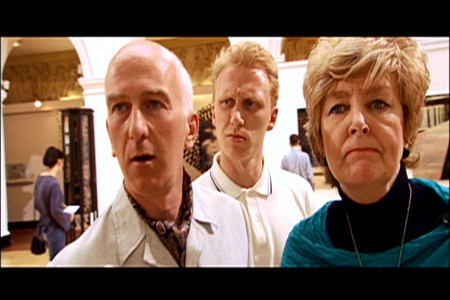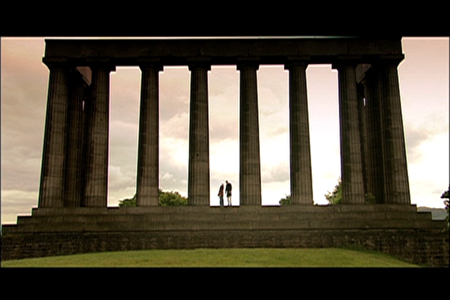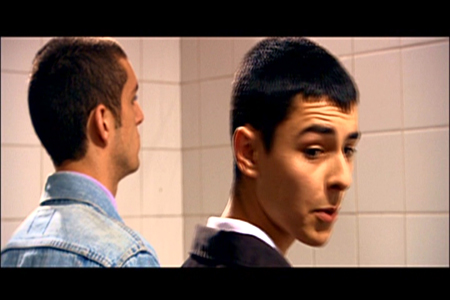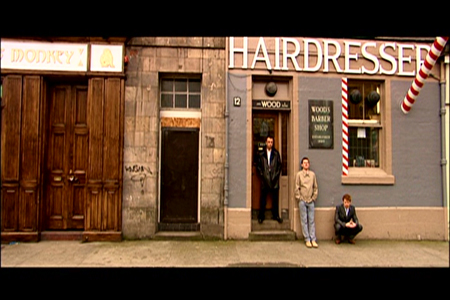
 BUY IT AT AMAZON: CLICK HERE!
BUY IT AT AMAZON: CLICK HERE!STUDIO: Tartan
MSRP: $22.95
RATED: R
RUNNING TIME: 96 Minutes
SPECIAL FEATURES:
• Director’s Commentary
• Behind-the-Scenes Featurette
• The Film in Storyboards
The Pitch
The Case says it’s A Clockwork Orange meets Trainspotting and that works for me.
The Humans
Kevin McKidd, Laura Fraser, Susan Lynch, Jim Carter, Ewen Bremner
The Nutshell
As a child, Frankie Mac (McKidd) idolized his parents, their lifestyle and, most importantly, their love. His parents were his heroes, especially his dad. He looked up to his father as a strong family man and an incredible social god. After seeing his father involved in not one, but two extramarital trysts (on the street, of all places), his entire life is shattered, leaving him to question everything that had defined his world. He inevitably looks for solace at the bottom of a bottle and spends the next 16 years immersed in a world of alcohol, violence and emptiness. Once Frankie discovers love of his own, he decides to start over and leave the past behind. However, that’s easier said than done.

It was then Frankie knew they were full of shit. Bold? A statement? It was a screenshot of Halo for fuck’s sake!
The Lowdown
16 Years of Alcohol, one of the few non-horror films on Tartan’s release list, is a film that is defined by its being able to relate to its audience. The central themes portrayed here are almost universal and I think everyone can find something here that they can find mirrored in themselves. But what makes this film so strong isn’t that Frankie Mac has to deal with all of these things in his life and it really isn’t even the way it’s presented as a snowball effect rather than a boulder slammed on his shoulders, keeping it from approaching overkill. No, although those things help the experience along, it’s the visual style of Richard Jobson that makes everything swell.
There’s a scene after young Frankie has lost his way that showcases Jobson’s eye for surrealism and is essentially a literary metaphorical paragraph put to screen. It would have been easy (and is usually the norm in these straight dramas) to not do that, to play the scene as realistic as possible for fear of the fantastic pulling the viewer out of the emotion and bleakness of what was going on. But it works and it works wonderfully. Whereas a lot of directors would keep the narrative and the visuals strictly cemented in social realism, Jobson isn’t afraid to show you what the character thinks, as opposed to what he sees. It doesn’t happen a lot, but it’s used to wonderful effect and really helps the viewer relate even more to what’s being said throughout. In a similar vein, the much lamented use of narration, or voice-over, is a nice addition here. In a movie all about a character’s journey, it’s nice to know what that character thinks about the events unfolding on screen. Not so much as a commentary, but an afterthought, a "hindsight is 20/20" type of scenario. The voice-over is used at a much greater extent than the surrealistic visuals, but I would have a hard time seeing how anyone coupld find something to complain about in this case.

Welcome to North Haversham! Home of the World’s Largest Jeep Wrangler Grill!
Of course, one director does not a great film make. Kevin McKidd is wonderful here. In a script that calls for a range of emotions from one end of the spectrum to the other, McKidd delivers naturally, with an assuredness that makes the depths into which this character sinks all the more unnerving. I wish I could say the rest of the cast delivers on the same level, but they really don’t have to. [The Actress] (Mary), is the only one with whom I was slightly disappointed. She was supposed to represent Frankie’s redemption, his one last chance for survival, but [actress] didn’t really give off that sort of light. She was good in the role on a superficial level, but never really connected with the audience in the way that she was supposed to. I suppose the same could be said for [actor], who plays Miller. This is a tough one because Miller is menacing enough and as a representation of the dark past Frankie’s trying to escape, that menace is good, but when, as a character, you’re the physical representation of 16 years of chaos, I’d like to think that representation could be a little meatier.
There are only two things that bother me about this film. One is the choppy narration. The progress and relapses that Frankie goes through are represented wonderfully in and of themselves, but it’s the flow, the in between that isn’t given much (if any) representation. It feels a little too staccato to be a fluid story of someone’s life. The other is the way it’s all wrapped up (we’re venturing into semi-spoiler territory here, so if you want to avoid that just skip to the next paragraph altogether). I honestly can’t decide what Jobson’s saying here. At first glance, taken in context with Frankie’s commentary on hope, it seems to be saying "You can’t fix it once you’ve fucked it up so trying just makes it all the worse." But, another way to look at it, the way I prefer, is that you just can’t forget the past. You can move on but make sure you learn from it. Make sure you carry those things with you, because if you leave it ALL behind, it will sneak up on you when your guard is down. Like I say, this is the message I prefer to glean, but the completely dismal view of hope given throughout the entire film makes it a little bit harder of a sell.

"Wow. You gotta stand that far back, huh? Impressive."
In the end though, I definitely recommend this movie, if for no other reason than it’s nice to be able to take something from a film and realistically mirror it in your life. It makes the experience more profound and raises the level of appreciation you have for it.
The Package
The artwork here is simplistic, featuring a blurry Frankie lost in the haze of the world around him. I like it and there’s a nice representation of the themes and attitudes of the narrative within.
Feature-wise, there’s a director’s commentary, in which Jobson reveals the personal struggles which prompted his involvement in the film. He’s an engaging speaker offers up a little insight on everything being seen, in case you don’t see it right away.
There’s a BTS featurette, but for some reason it hated my DVD Player (or vice verse) and no matter what I did I couldn’t get it to play. And finally there’s a storyboard sequence which is just that (I’ve always found those things boring anyway).
Not a stacked disc by any means, but the commentary is worth the menu space alone. Oh and if you’re able to see the BTS featurette, let me know how it was.

"Hey you, come get a fuckin haircut, ya furry bastid!" "Yeah, don’t make us come drag you in here!"
8.5 out of 10